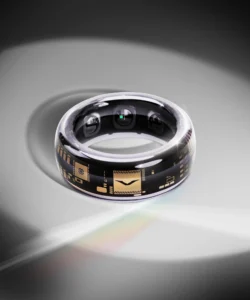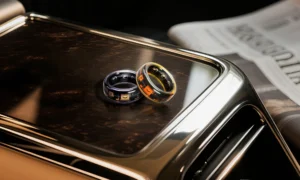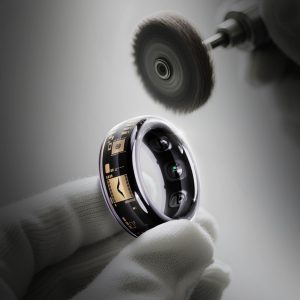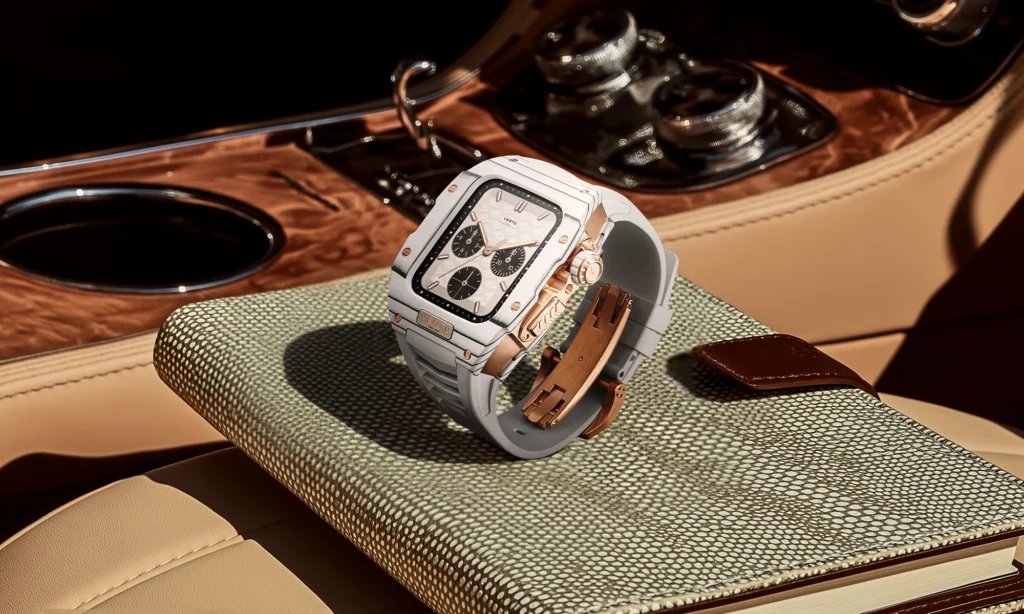
If you want the best health tracking, both fitness trackers and smartwatches have their advantages. If you use a smart device to track fitness, you probably care about how well it monitors your heart rate, steps, and sleep. Studies show that smart devices like the Oura Ring and Fitbit can track sleep accurately for some people, with accuracy rates over 75%. The Apple Watch’s sleep tracking ranges from 50% to 86%. These differences are important if you rely on a smart device to track fitness and achieve your health goals. Having good health data from your smart device helps you make better choices every day.
Key Takeaways
-
Smartwatches like the Apple Watch track heart rate very well. They can be accurate up to 86%. Pick a device that matches what you need for health tracking.
-
Fitness trackers are great at counting steps. They also last longer on one charge. These are good for people who want simple health numbers.
-
Sleep tracking is not always correct. Use your device to see sleep patterns. Do not trust the exact numbers every time.
-
Think about how your device fits and where you wear it. A tight fit helps track heart rate better. It also helps other health numbers be right.
-
Apps make tracking easier and more fun. Use them every day to check your progress. They help you set and reach health goals.
Accuracy Comparison
Heart Rate
You want your heart rate numbers to be right. Heart rate is very important for health tracking. Devices like Apple Watch, Fitbit Charge 6, and Garmin Venu 3 use wrist sensors. Some brands are better than others. Apple Watch is the best with about 86% accuracy. Fitbit and Garmin also do well, both above 67%. Smartwatches often show you more live data. Fitness trackers last longer and have simple screens.
Tip: For best heart rate results, wear your device tight. If your band is loose, your numbers might be wrong.
Here’s a table that shows how brands compare for heart rate and other health numbers:
|
Brand |
Heart Rate Accuracy |
Step Count Accuracy |
Energy Expenditure Accuracy |
Sleep Accuracy |
|---|---|---|---|---|
|
Apple Watch |
81.07% |
71.02% |
N/A |
|
|
Garmin |
67.73% |
82.58% |
48.05% |
N/A |
|
Fitbit |
73.56% |
77.29% |
65.57% |
N/A |
|
Oura Ring |
13% |
3% |
4.8% |
6% |
|
WHOOP |
0.3% |
N/A |
10% |
N/A |
|
Withings |
98% |
11% |
58.3% |
6% |
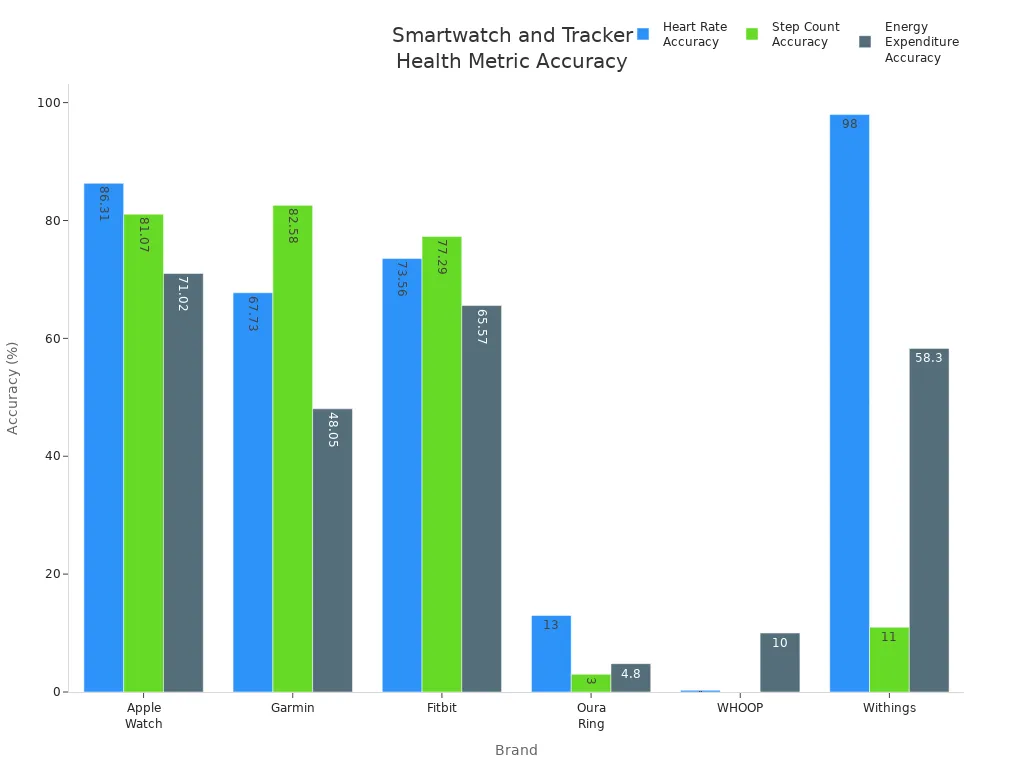
Steps
Counting steps is a favorite feature for many people. You want your device to count every step you take. This is true if you walk to school or run outside. Garmin Venu 3 and Fitbit Charge 6 are very good at this. Garmin is best with over 82% step accuracy. Fitbit and Apple Watch also do well, both above 77%. Some brands, like Jawbone and Polar, are not as good for steps.
-
Fitness trackers are usually better for counting steps.
-
You get better results if you wear your device on your non-dominant wrist.
-
Some devices miss steps if you push a stroller or carry bags.
If you want good step tracking, pick a device with strong step numbers and long battery life. This helps you track steps all day without charging.
Sleep
Sleep tracking helps you see how well you sleep at night. Both smartwatches and fitness trackers can track sleep, but they are not always perfect. Devices like Fitbit Charge 6 and Amazfit Active 2 use sensors to watch your movement and heart rate while you sleep. Oura Ring 3 is also popular for sleep.
Here’s what research says about sleep tracking:
|
Measurement Type |
Error Margin |
|---|---|
|
Total Sleep Time (TST) |
|
|
Sleep Efficiency |
Overestimated in multiple studies |
|
Wakefulness after Sleep Onset |
Underestimated by 12% to 180% |
Your device might say you slept longer than you did. It can miss times when you wake up at night. Most devices guess too high for sleep quality and total sleep time. Smartwatches like Apple Watch 8 and Galaxy Watch 5 have sleep tracking, but their accuracy is between 50% and 86%. Fitness trackers like Fitbit and Amazfit are often a bit better for basic sleep numbers.
Note: Sleep tracking is useful, but not perfect. Use it to see patterns, not for exact numbers.
Other Metrics
Smartwatches and fitness trackers now track more than just heart rate, steps, and sleep. You can find things like blood oxygen, VO2max, and stress tracking. Blood oxygen is a big trend, but accuracy changes by device. Most devices have blood oxygen, but the numbers are not always right. Some devices guess too high or too low for VO2max, depending on your fitness.
Here’s a table about these extra health numbers:
|
Metric |
Accuracy Description |
|---|---|
|
VO2max |
Tends to overestimate or underestimate based on user's fitness level. |
|
Blood Oxygen |
Limited information on accuracy specifically for blood oxygen levels. |
|
Stress Levels |
Varies among devices; no definitive metric established for stress tracking. |
-
Blood oxygen is on most new devices, but accuracy is not always clear.
-
Stress tracking can help you notice stress and try breathing exercises.
-
Use these health numbers as a guide, not as medical advice.
Battery life and app support are also important for health tracking. Devices with long battery life, like Amazfit Active 2, let you track health without charging often. Good apps, like Garmin Connect or Fitbit’s app, help you see your health numbers in one place. This makes it easier to spot patterns and get healthier.
Remember: No device is perfect. Use your health numbers to help you, but always listen to your body and talk to a doctor if you are worried.
Factors Affecting Results
Sensor Tech
You might wonder why some devices seem to know your every move. The secret is in the sensors. Modern fitness trackers and smartwatches use advanced sensors to track your steps, runs, swims, and sleep automatically. These sensors keep an eye on your heart rate and blood oxygen all day. Some watches even have medical-grade ECG features that help spot heart problems. You can get real-time updates on your body temperature, which helps you notice if you’re getting sick. Sleep tracking has gotten better, too, showing you patterns that help you rest well. If you want to track your cycle, many devices now offer that option. New sensor technology keeps getting smaller, faster, and more accurate, making health tracking easier for you.
Tip: Devices with the latest sensors can give you more reliable health data, so check for these features when you shop.
Fit & Placement
How you wear your device matters a lot. If your tracker sits too loose or in the wrong spot, your numbers might be off. Here’s a quick look at how fit and placement affect accuracy:
|
Factor |
Influence on Accuracy |
|---|---|
|
Device Placement |
|
|
Device Fit |
Changes how valid your health data is |
|
Wear Time |
Longer wear can mean better health tracking |
Wrist trackers usually give you the best heart rate numbers, especially compared to clip-on trackers. Chest straps are the top choice for exercise because they track heart rate very closely. Smart rings and adhesive patches offer new ways to track health, and they’re easy to wear all day. If you want something discreet, try a clip-on tracker or a smart ring. These options work well for basic activity and health monitoring.
Usage Habits
Your habits play a huge role in how well your device tracks health. If you wear your tracker every day, you’ll get more accurate data. Skipping days or only wearing it for certain activities can lead to mistakes in your health numbers. The type of activity you do also matters. Devices may work better for walking than for high-intensity workouts. When you check your stats often, you might feel more motivated to stay healthy. Some devices even give you feedback that can boost your mood and help you stick to your goals.
Note: The more you use your device, the better your health tracking will be. Make it part of your daily routine for the best results.
Smart Device Track Fiteness
Health Metrics
When you use a smart device track fiteness, you get a lot of health data. These devices watch your heart rate, steps, sleep, and even blood pressure. You can see how active you are every day. Some smartwatches and fitness trackers also check your blood oxygen and VO2 Max. If you want to know how well your body works during exercise, these advanced health features help you learn more.
Here’s a table that shows how smart device track fiteness compares for different health metrics:
|
Health Metric |
Accuracy Level Description |
|---|---|
|
Heart Rate |
Changes a lot with exercise and arm movement. |
|
Sleep Quality |
Often looks better than it is because devices use movement to guess sleep. |
|
Blood Pressure |
Most devices have trouble tracking this well. |
|
Step Count |
Works well if you wear your device right, but mistakes can add up. |
|
VO2 Max |
Not as accurate as tests in a lab. |
You can use a smart device track fiteness to follow your health goals. If you want to run outside, gps tracking helps you see your route and speed. Many people like activity tracking because it shows progress over time. Your activity tracker can help you stay motivated and reach new goals.
Tip: Always check your device’s health tracking features before you buy. Some models have more health metrics than others.
App Support
Apps make smart device track fiteness even better. You can use Garmin Connect or Zepp to see all your health numbers in one place. These apps help you spot patterns and track your progress. You get easy charts and tips to improve your health. If you want to compare your results, these apps let you see how you do over weeks or months.
-
Garmin Connect and Zepp use special tools to check your health data.
-
These apps work with many devices, so you can switch brands and keep your health records.
-
You get reminders to move, drink water, or sleep better.
-
The apps help you set goals and see if you reach them.
Smart device track fiteness works best when you use the right app. You get more reliable health data and better advice. If you want to get the most from your activity tracker, try using the app every day.
Note: Apps can make health tracking easier and more fun. You learn more about your body and how to stay healthy.
Fitness Trackers vs Smartwatches
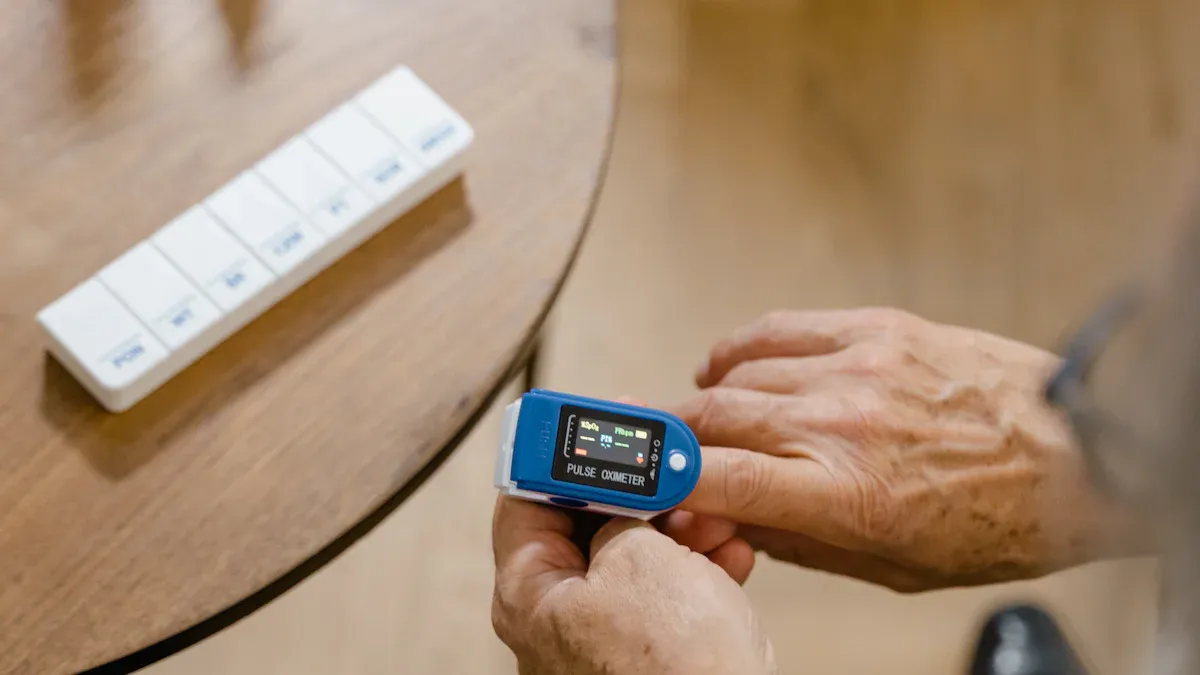
Pros and Cons
Fitness trackers and smartwatches have different good points. Fitness trackers are made for health tracking. They are good at counting steps, heart rate, and sleep time. Many people use a fitness watch every day. If you want something simple, fitness trackers are a good pick. They last longer on one charge and cost less money. You can buy affordable ones like Fitbit Charge 6, Garmin Vivoactive 6, or Amazfit Active 2.
Smartwatches have more things you can do. You get smart notifications, music, and GPS. Some top smartwatches have better health sensors. Smartwatches track heart rate well, but not as well when you exercise. Fitness trackers sometimes do not track energy use very well. Both types can guess too high for sleep and calories burned.
Here is a table that shows the good and bad sides:
|
Device Type |
Pros |
Cons |
|---|---|---|
|
Fitness Trackers |
Accurate steps, heart rate, sleep; long battery; affordable |
Weak energy tracking; basic design |
|
Smartwatches |
Smartwatch features; advanced sensors; stylish |
Shorter battery; higher price; less accurate during workouts |
Tip: Pick a fitness watch with strong step and heart rate accuracy if you want good health tracking.
User Experience
You want a device that is easy and feels nice to wear. Many people say fitness trackers are simple to use. The screens are easy to read and show health stats fast. Most fitness watches are light and comfy. People like to track heart rate and steps. Some think fitness trackers are just “okay” for the price, but they trust the step and heart rate data.
Smartwatches look cool and have more smart tools. You can answer calls, read messages, and use apps. Some people say smartwatches look nicer and last longer. You may see differences in how they look and how strong they are. Both types track health well, but you might like one more for your needs.
-
Fitness trackers are best for health and activity.
-
Smartwatches are great for extra features and style.
-
Cheaper choices like Fitbit Charge 6, Garmin Vivoactive 6, and Amazfit Active 2 give good health tracking for less money.
Note: Try out different devices to find the best fitness watch for you. Your comfort and health goals are most important.
Best Fitness Trackers & Alternatives
Top Picks
You want a device that fits your life and gives you reliable health data. If you check fitness tracker reviews, you’ll see some names pop up again and again. Here are the best fitness trackers you can buy right now:
-
Garmin vivoactive 5: Great for all-around tracking and easy to use.
-
FitBit Charge 6: Perfect for everyday health monitoring and simple setup.
-
Whoop 4.0: Top choice if you care about sleep and recovery.
-
FitBit Inspire 3: Good for beginners who want to start tracking.
-
Garmin Forerunner 265: Best for runners who want accurate stats.
-
Xiaomi Mi Smart Band 6: Budget-friendly and still tracks the basics.
-
Garmin Fenix 7x Sapphire: Amazing battery life for long adventures.
-
Samsung Galaxy Watch5: Works well with Android phones.
-
Apple Watch Series 9: Best pick for iPhone users.
-
Withings ScanWatch Light: Combines analog style with smart features.
-
UltraHuman Ring Air: Stylish and modern for those who want something different.
-
Oura Ring: Small, powerful, and great for sleep tracking.
Tip: Pick a tracker that matches your daily routine. If you run, swim, or just walk a lot, there’s a model for you.
Discreet Options
Maybe you want something that doesn’t stand out. Smart rings are a clever choice. You can wear them like regular jewelry, and nobody will notice you’re tracking your health. Their small size makes them versatile. You get sleep tracking, step counting, and even stress monitoring without a bulky watch.
-
Smart rings use advanced algorithms to check your sleep stages.
-
You can spot patterns in your rest and make changes for better recovery.
-
These rings help you keep an eye on your health without drawing attention.
If you want a tracker that blends in, smart rings and screenless bands are worth a look. You get the benefits of health tracking in a simple, stylish package.
Choosing What’s Right
Accuracy Needs
When you pick a health tracking device, you want numbers you can trust. Some devices use better sensors, and some work best in certain spots on your body. The way your device reads and processes data can change how accurate your health stats are. Here’s a quick table to help you see what matters most for accuracy:
|
Factor |
Description |
|---|---|
|
Type of Sensors |
Devices use different sensors, like PPG or accelerometers, for health data. |
|
Placement on Body |
Where you wear your device, like wrist or finger, affects accuracy. |
|
Algorithms Used |
The way your device calculates results can change your health numbers. |
If you care about tracking your heart rate or sleep, check what sensors your device uses. Some fitness trackers do better with steps, while smartwatches might give you more live data. Think about your fitness goals. Do you want to track every step, or do you care more about sleep and recovery? The right device helps you reach your fitness goals with numbers you can trust.
Tip: Try wearing your device in the spot it recommends. You’ll get better results and more reliable health data.
Lifestyle Fit
Your daily routine matters when you choose a health tracker. You want something that fits your life and keeps you motivated. Here are some things to think about:
-
Runners often pick Garmin smartwatches for GPS tracking.
-
If you care about style, you might like a smart ring such as Oura.
-
Some people want simple devices that only track steps and sleep.
-
The way you use your device can change how much you trust the numbers.
-
Many people feel more motivated when they see their progress.
-
Some users get obsessed with tracking every detail, so pick a device that feels right for you.
-
In 2019, lots of Americans started using wearable fitness devices, showing how popular health tracking has become.
-
Ask yourself what you need most. Do you want to track workouts, sleep, or just stay active?
You should choose a device that matches your habits and helps you stay on track. If you want to reach your fitness goals, pick a tracker that fits your lifestyle and keeps you moving.
You want the most accurate health tracking, so smartwatches like the Apple Watch often lead for heart rate and energy tracking. Check out this table for a quick look:
|
Device |
Heart Rate Accuracy |
Energy Expenditure Accuracy |
|---|---|---|
|
Apple Watch |
86.31% |
71.02% |
|
Fitbit |
73.56% |
65.57% |
|
Garmin |
67.73% |
48.05% |
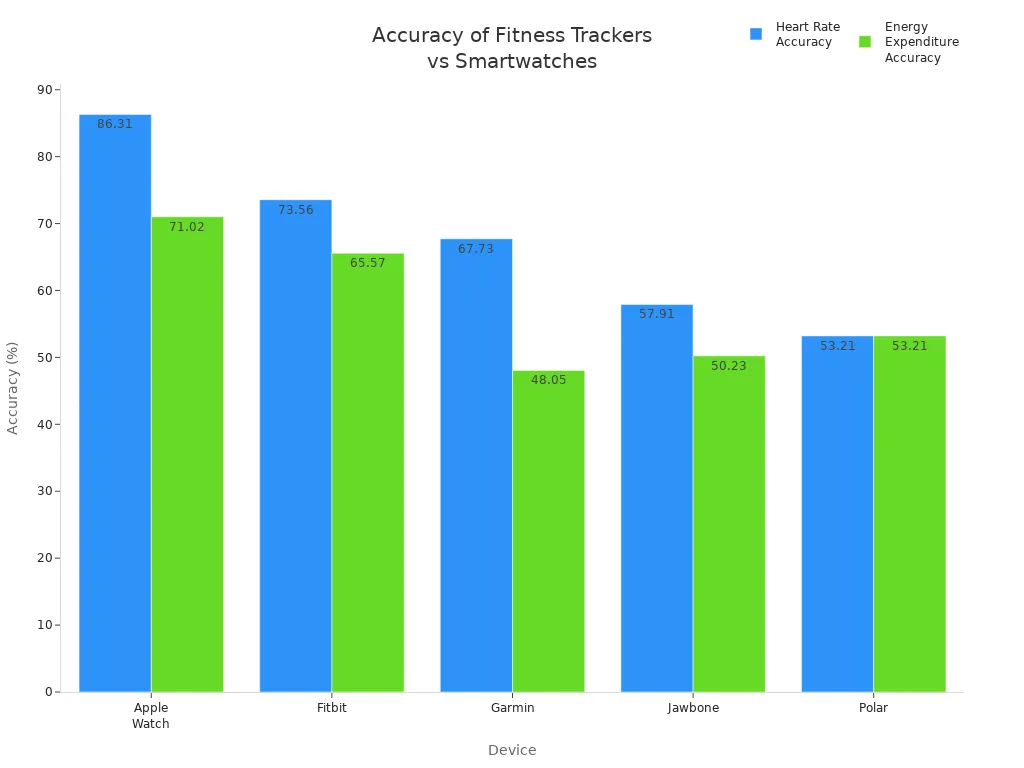
Fitness trackers last longer and cost less, but smartwatches give you more features. To pick the right device, think about these tips:
-
Make sure your device works with your phone.
-
Choose features that matter most to you.
-
Set a budget before you shop.
-
Use your device every day and set health goals for better results.
You get the best tracking when you pick a device that fits your life and keeps you motivated.
FAQ
Can you trust the health numbers from your fitness tracker or smartwatch?
You can trust most numbers for steps and heart rate. Sleep and calories might not be exact. Use your device to spot patterns and changes, not for medical advice.
Which device works best for tracking sleep?
Fitness trackers like Fitbit and smart rings such as Oura often do better for sleep. You see trends in your sleep, but the numbers may not match what a sleep lab finds.
Do smartwatches track workouts better than fitness trackers?
Smartwatches give you more workout features, like GPS and live stats. Fitness trackers focus on steps and heart rate. If you want more details, pick a smartwatch.
How long does the battery last on these devices?
Fitness trackers usually last 5 to 10 days. Smartwatches need charging every 1 to 3 days. If you want less charging, choose a tracker.
Can you use these devices without a smartphone?
Some fitness trackers and smartwatches work alone. You get basic stats on the screen. For full features and health reports, you need to connect to a phone app.


